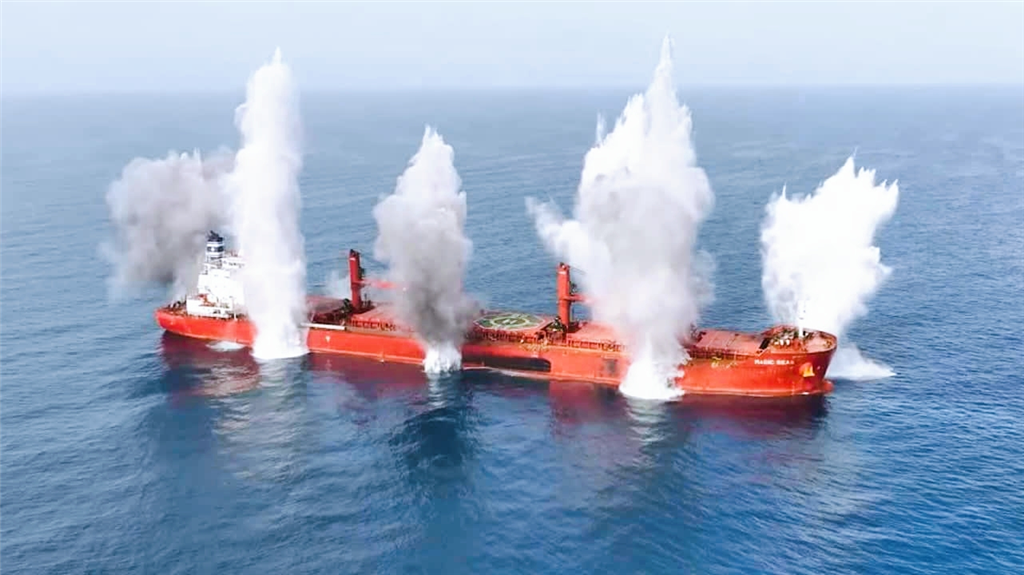Shipping hesitates on Red Sea return

Experts covering the Red Sea shipping crisis have advised caution over any swift return to the Middle Eastern tradelane.
Yesterday, the Houthis officially announced that they have paused maritime attacks on Israel and lifted their so-called naval blockade on Israeli ports. This announcement appeared at the end of a letter sent to Hamas’s military wing, Kata’ib al-Qassam, by the newly appointed Houthi chief of staff, Yousef Hassan Al-Madani, who succeeded Mohammed Al-Ghamari after he died in Israeli airstrikes.
The Houthi strikes, which killed at least nine seafarers and sank four ships, forced global trade to reroute around the Cape of Good Hope for the past couple of years, propping up ton-miles and freight rates.
While confirming a pause for now, Al-Madani added that if the conflict in Gaza continues, the Houthis would consider resuming their own operations, including renewed pressure on maritime routes.
Container shipping consultant Lars Jensen, whose daily LinkedIn coverage of the Red Sea crisis has now stretched on for 724 days, reminded his followers on social media today that the Houthis did observe a ceasefire at the start of this year, but when hostilities resumed in Gaza, the Houthis also resumed their activities.
“Based on the developments earlier this year, it appears premature to interpret the Houthi ceasefire as a sign of an imminent return by the shipping lines,” Jensen suggested.
“Given the ongoing uncertainty in the Red Sea and Bab al-Mandeb strait, we do not expect an immediate improvement of commercial shipping traffic in the region,” shipping analysts at SEB, a Swedish bank, advised today.
Peter Sand, chief analyst at Xeneta, an ocean and air freight intelligence platform, said: “Details are sketchy and you cannot base the safety of crews, ships and cargo on the word of Houthi militia. Carriers need far more assurance than that and, perhaps more importantly, so do insurance companies.”
Maritime security specialist Ambrey has reported that Bab el-Mandeb transits have modestly increased in recent days. Two Greek companies have restarted transits, and other companies are openly transiting when they have previously withheld AIS transmissions.
Ambrey has been asked to re-evaluate company policies on avoiding the Bab el-Mandeb and has advised that, for some, the risk has now returned to levels tolerable to them.
In terms of tonne-mile demand uplift brought about by the continued diversions around the Cape of Good Hope – based on latest estimates from Clarksons Research – containerships currently lead with a 10.7% increase, followed by car carriers (+6.8%), LNG carriers (+5.4%), chemical tankers (+1.8%), dry bulk carriers (+1.1%), crude tankers (+0.8%), and product tankers (below +0.5%).
A large scale return to the Red Sea would reduce the transport work required of the container fleet in particular and potentially cause freight rates to plummet – unless carriers take drastic measures, such as idling, demolition, slow-steaming and widespread blank sailings.
Xeneta’s Sand noted that average spot rates from Far East to North Europe, Mediterranean and US East Coast – three trades that would ordinarily transit the Red Sea – are all down more than 50% since the start of year.
“Carriers are already heading into loss-making territory and freight rates are expected to fall up to 25% globally in 2026, even with no change to the situation in the Red Sea,” Sand warned.
A big-scale return to Suez – Red Sea routings will likely not happen in the near future, analysts at Alphaliner argued in their most recent weekly report, since that would require major network revamps for the big carriers and the East – West alliances. “Carriers will therefore be cautious of switching until they can have certainty that Red Sea routings will be safe and reliable for the foreseeable future, and not just for the next few weeks,” Alphaliner suggested.
Year-to-date, satellite data on Gulf of Aden arrivals shows the traffic of commercial shipping down 47% from same period in 2023, while being up 7% from the same period in 2024, according to data compiled by SEB. Similar data on Suez Canal transits shows the traffic of commercial shipping down 53% from same period in 2023, and down 7% from the same period in 2024.

- 11/14/2025
- Shipping News

